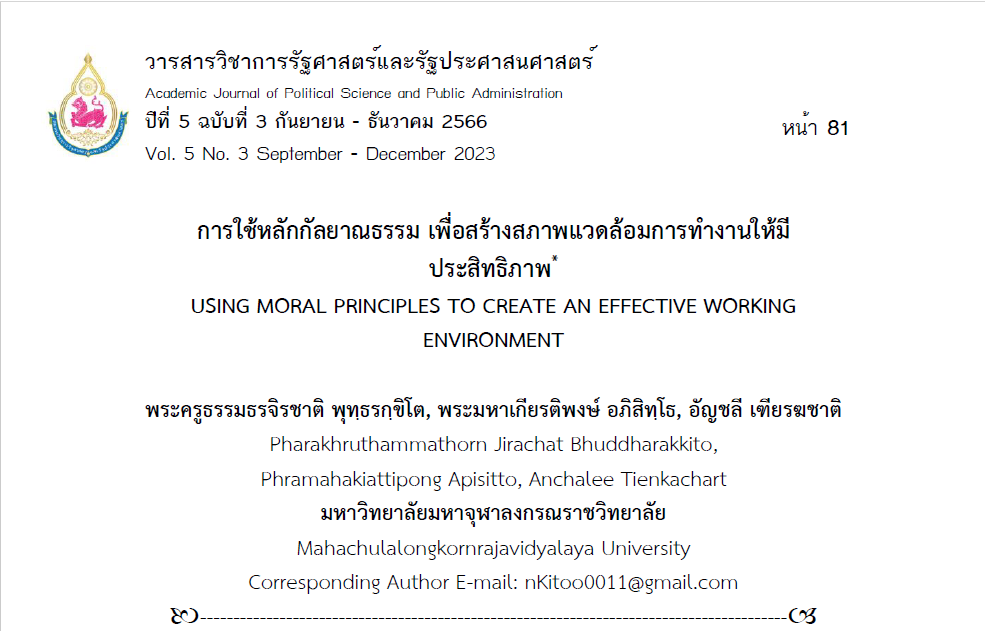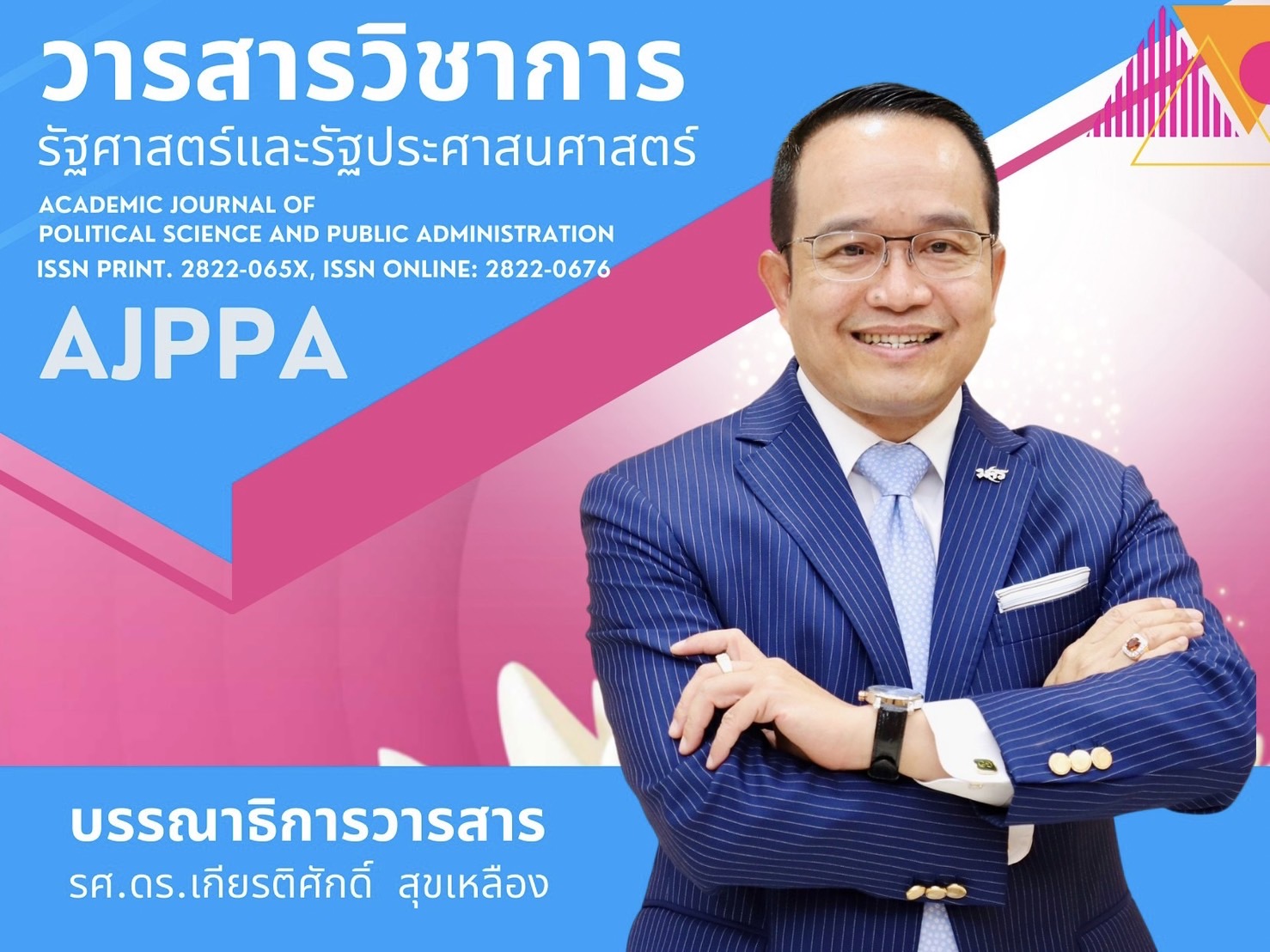การใช้หลักกัลยาณธรรม เพื่อสร้างสภาพแวดล้อมการทำงาน ให้มีประสิทธิภาพ
คำสำคัญ:
หลักกัลยาณธรรม, สภาพแวดล้อม, ประสิทธิภาพบทคัดย่อ
การทำงานในองค์กรสิ่งสำคัญประการหนึ่งคือสภาพแวดล้อมในการทำงาน บทความวิชาการนี้ เสนอมุมมองการสร้างสภาพแวดล้อมเชิงบวกโดยใช้หลักกัลยาณธรรมทางพระพุทธศาสนา มาร่วมกับทฤษฎีการสร้างสภาพแวดล้อมการทำงาน
ทั้ง 4 ด้านประกอบด้วยด้านกายภาพ ด้านจิตใจ ด้านความมั่นคงในอาชีพการงาน และความปลอดภัย การทำงานร่วมกันในองค์กร หากบุคลากรไม่ได้รับการสนับสนุนสภาพแวดล้อมการทำงานที่ดี งานที่ได้จะประสบปัญหาการทำงานล่าช้า ขาดความสุขจากการทำงาน สิ่งอำนวยความสะดวกไม่เพียงพอ พนักงานมองประโยชน์ส่วนตนมากกว่า
ขาดความกระตือรือร้นในการทำงาน เกิดความเครียด ส่วนสภาพแวดล้อมที่ทำให้เกิดความคิดเชิงบวกย่อมก่อให้เกิดวัฒนธรรมอันดีงาม มีความไว้วางใจกัน พร้อมรับฟังและแก้ปัญหาร่วมกัน การใช้หลักกัลยาณธรรมประกอบด้วย 1.เมตตา กรุณา มีความรักใคร่ปรารถนาให้ผู้อื่นมีความสุข 2.ทาน แบ่งเอื้อเฟื้อให้กับผู้อื่นในสิ่งที่เขาบกพร่อง
3.กามสังวร รู้จักยับยั้งควบคุมตนไม่ให้ฟุ้งเฟ้อกับสิ่งภายนอก 4. สัจจะ ความซื่อตรงที่มีต่อองค์กร สร้างความเชื่อมั่นทั้งภายในและนอกองค์กร 5.สติสัมปชัญญะ ระลึกรู้ตัวอยู่เสมอใช้สติปัญญาทบทวนแก้ไขปัญหา ไม่ใช้อารมณ์ ไม่หลงฟังคำนินทานต่าง ๆ
เมื่อนำมาใช้ร่วมกับการบริหารจะช่วยเสริมจุดอ่อนในองค์กร พนักงานจะเกิดความผูกพัน มีความไว้วางใจ เกิดความรู้สึกว่ามีตัวตนในองค์กร มั่นใจต่อการทำงานว่าจะไม่ทอดทิ้งกัน เกิดสังคมที่เป็นครอบครัว ร่วมกันดำเนินชีวิตด้วยความปลอดภัย ปราศจากความคลางแคลงใจ ไม่หลงไปตามวัตถุภายนอกจนเกินไป สร้างภาพลักษณ์ที่ดีมีประสิทธิภาพต่อองค์กร
เอกสารอ้างอิง
กอปรลาภ อภัยภักดิ์. (2563). บรรยากาศองค์กรแห่งความสุข : คนเบิกบาน งานสำเร็จ, วารสาร มจร มนุษยศาสตร์ปริทรรศน์, 6(1), 315 - 331.
ฉัตรภรณ์ กาทองทุ่ง. (2560). สภาพแวดล้อมการทำงานและความสมดุลระหว่างชีวิตกับการทำงานที่มีอิทธิพลต่อคุณภาพชีวิตการทำงานของพนักงานบริษัทก่อสร้าง (ปริญญาบริหารธุรกิจมหาบัณฑิต วิชาเอกการจัดการวิศวกรรมธุรกิจ). ปทุมธานี: มหาวิทยาลัยเทคโนโลยีราชมงคลธัญบุรี.
ชลินธร บุตรดีวงศ์. (2562). ความเป็นกัลยาณมิตรของผู้บริหารกับความผูกพันต่อองค์กรของครูในโรงเรียนสังกัดสำนักงานเขตพื้นที่การศึกษาประถมศึกษามุกดาหาร (วิทยานิพนธ์ศึกษาศาสตรมหาบัณฑิต สาขาวิชาการบริหารการศึกษา). กรุงเทพฯ: มหาวิทยาลัยศิลปากร.
ธวัชชัย รัชสมบัติ และคณะ. (2565). สภาพแวดล้อมการทำงานที่ส่งผลต่อคุณภาพการปฏิบัติงานของพนักงานสายสนับสนุนในมหาวิทยาลัยสารคาม, วารสารวิทยาการจัดการ, 4(4), 31-43.
พระอธิการธราธร นาถธมฺโม (เทพวรรณ). (2564). กัลยาณธรรม : กระบวนการพัฒนาพฤติกรรมมนุษย์. Journal of Roi Kaensarn Academi, 6(12), 421-434.
พัชราภรณ์ ผิวผ่องและคณะ. (2560). ผลกระทบของสภาพแวดล้อมในการทำงานสมัยใหม่ที่ดีที่มีต่อประสิทธิภาพ ในการปฏิบัติงานของพนักงานประจำศูนย์บริการ True ในเขตภาคตะวันออกเฉียงเหนือ, วารสารการบัญชีและการจัดการ, 9(4), 29-39.
มนตรี อินตา. (2556). พฤติกรรมทางจริยธรรมด้านเบญจธรรมของนักศึกษาคณะครุศาสตร์ มหาวิทยาลัยราชภัฏเชียงใหม่ (รายงานวิจัย). เชียงใหม่: มหาวิทยาลัยราชภัฏเชียงใหม่.
สำนักงานสนับสนุนสุขภาวะองค์กร. (2566) ผลการสำรวจระดับประเทศ ความสุขคนทำงาน (ในองค์กร) พ.ศ. 2564. สืบค้น 3 พฤษภาคม 2566, จาก https://happy8workplace.thaihealth.or.th/news/40.
สุกริน ทวีสุต. (2562). ปัจจัยสภาพแวดล้อมในการทำงานที่สัมพันธ์กับความสุขในการทำงานของบุคลากรเทศบาลนครหาดใหญ่ (สารนิพนธ์รัฐประศาสนศาสตรมหาบัณฑิต สาขาวิชารัฐประศาสนศาสตร์). สงขลา: มหาวิทยาลัยสงขลานครินทร์.
สุดา วงศ์สวัสดิ์. (2566). 4 สัญญาณบอก “ไม่มีความสุข” ในการทำงาน. สืบค้นเมื่อ 2 พฤษภาคม 2566, จาก https://www.thaihealth.or.th/?p=254078.
สุวรรณี หงส์วิจิตร และคณะ. (2564). ปัจจัยสภาพแวดล้อมในการทำงานและปัจจัยการทำงานเป็นทีมที่ส่งผลต่อประสิทธิภาพในการทำงานของพนักงานโรงพยาบาลศุภมิตร จังหวัดสุพรรณบุรี (รายงานการวิจัย). นนทบุรี: มหาวิทยาลัยเทคโนโลยีราชมงคลสุวรรณภูมิ.

ดาวน์โหลด
เผยแพร่แล้ว
รูปแบบการอ้างอิง
ฉบับ
ประเภทบทความ
หมวดหมู่
สัญญาอนุญาต
ลิขสิทธิ์ (c) 2023 วารสารวิชาการรัฐศาสตร์และรัฐประศาสนศาสตร์

อนุญาตภายใต้เงื่อนไข Creative Commons Attribution-NonCommercial-NoDerivatives 4.0 International License.




